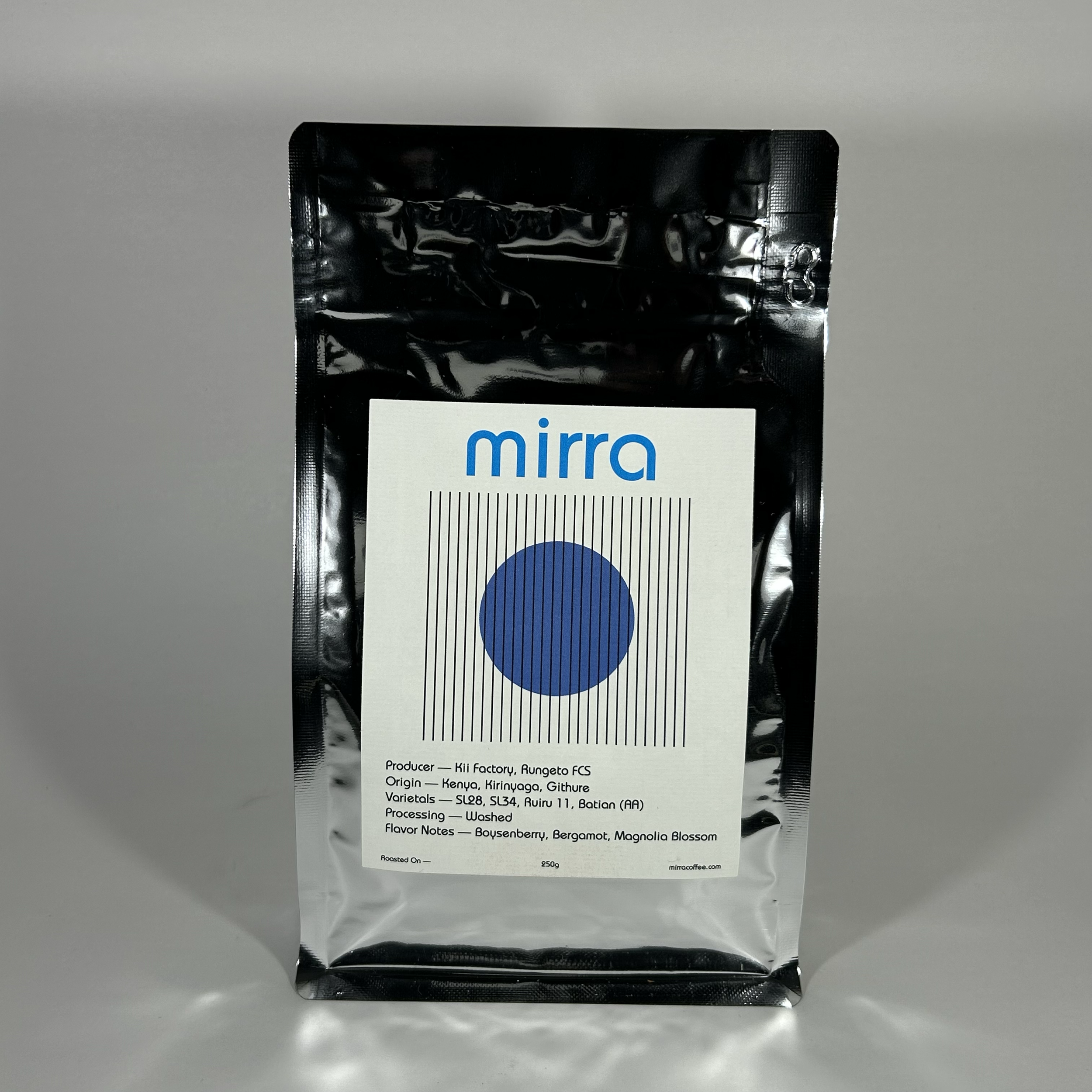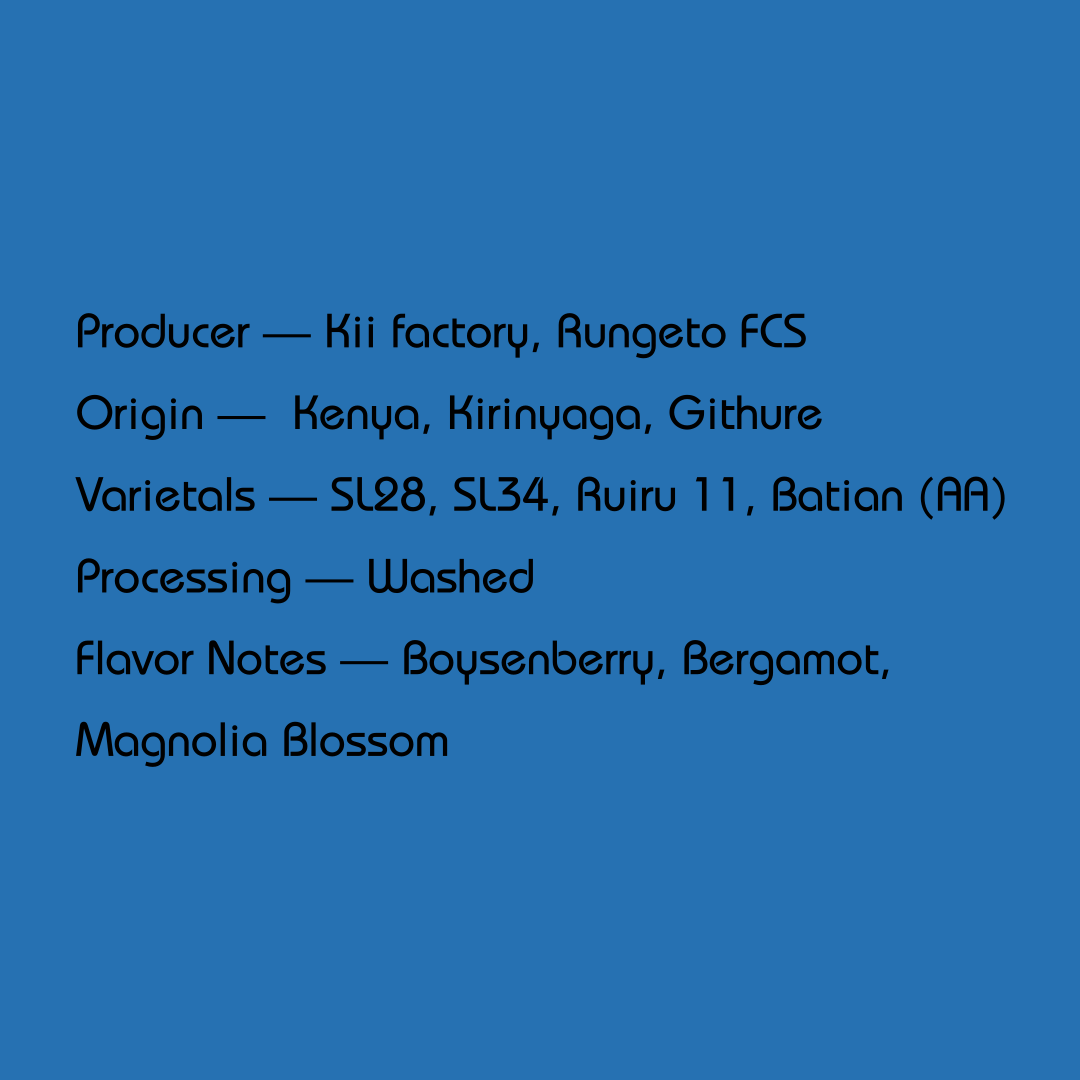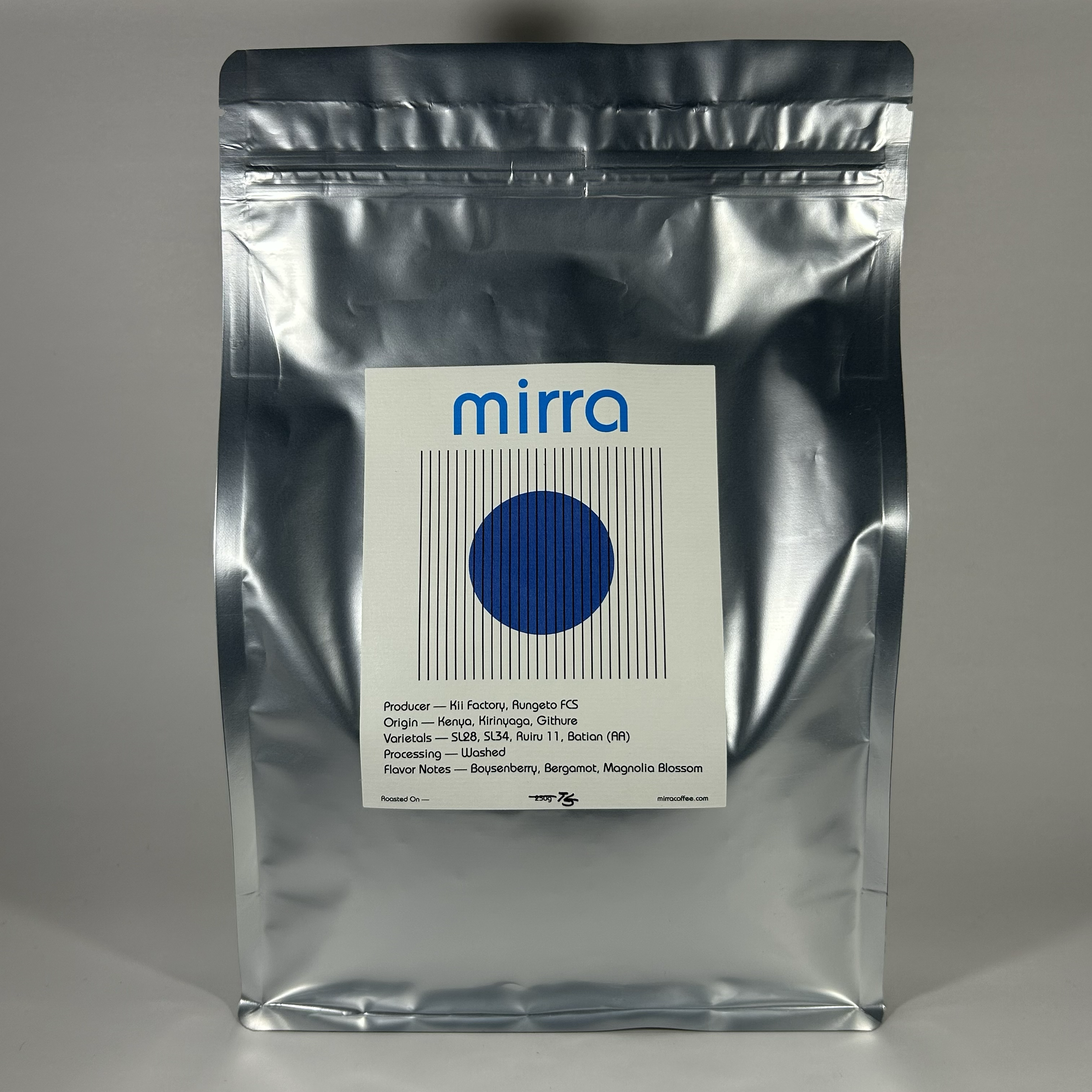 Image 1 of 3
Image 1 of 3

 Image 2 of 3
Image 2 of 3

 Image 3 of 3
Image 3 of 3




Kenya Kii
For the past two years, we have found it a bit of a struggle to find coffees from Kenya that met our standards of complexity, uniqueness, and general quality; from the very first taste, this beautiful lot from Kii, however, met and exceeded these expectations, and we knew we had to secure it to share with our customers and fans this season. It’s truly everything you would want in a classic washed Kenyan coffee, lots of dark berries, bright and citric bergamot, and highlights of lemony magnolia blossom. This offering provides a deep yet incredibly bright tasting experience in the cup, and we can’t wait to share and enjoy this one ourselves this season.
Kii Coffee Factory is located near the town of Embu, in the Kirinyaga district of Kenya, which is in the country’s center, just a bit north of the capital, Nairobi. The factory was first established in 1968 to serve the villages of Gathanjuri, Kibae, Kianduma, and Kiandumbe. Currently, it is partnered with the Rungeto Farmers Cooperative Society, whose membership included over 1.300 farmers in the region. The factory and most of the contributing farms lie at 1.600 masl. 99% of the varietal-composition of the lots coming out of the Kii factory are SL28 and SL34, with Ruiru 11 and Batian accounting for less than 1% of production, resulting in superior quality compared to most Kenyan field blends, due to the quality of SLs over Ruiru 11 and batian, comparatively.
This offering is composed of the four most common Kenyan varietals, SL28, SL34, Ruiru 11, and batian. SL28 is perhaps the most lauded common African cultivar for its quality and strong drought resistance. It is a cultivar of the bourbon genetic group which was first released by Scott Agricultural Laboratories in 1935 in Kabete, Kenya. It quickly became dominant throughout Kenya and has now spread beyond East Africa to Central and South America, due to its high potential for quality. SL34 is an African coffee cultivar of the typica genetic group, prized both for its quality and strong resistance to coffee berry disease. It was first selected from a single tree on the Loresho Estate in Kabete, Kenya by Scott Agricultural Laboratories, and released for cultivation in the late 1930s. Today, most SL34 trees remain confined to Kenya. Ruiru 11 is a composite variety, whose female parent is catimor, and whose male parents include several varietals—sudan rume, K7, SL28, N39, and others. It was created in direct response to an epidemic of coffee berry disease which occurred in 1968, and led to a 50% decrease in Kenya’s coffee production that year. After much research, Ruiru 11 was released for cultivation in 1985 by the Ruiru Coffee Research Station. This varietal is known for its disease resistance, as intended, and good quality potential when grown at altitude. Finally, batian is a varietal that is composed of several other varietals, namely, SL28, SL34, sudan rume, 39, K7, SL4, and timor hybrid. It was first created by the Coffee Research Station in Ruiru, Kenya in 2010, and cultivated there for its resistance to leaf rust. Batian trees are on the tall side, and are known for their potential for quality at altitude, and disease resistance.
All coffee is sold whole-bean to reduce oxidization, and increase the longevity of volatile organic compounds.
For the past two years, we have found it a bit of a struggle to find coffees from Kenya that met our standards of complexity, uniqueness, and general quality; from the very first taste, this beautiful lot from Kii, however, met and exceeded these expectations, and we knew we had to secure it to share with our customers and fans this season. It’s truly everything you would want in a classic washed Kenyan coffee, lots of dark berries, bright and citric bergamot, and highlights of lemony magnolia blossom. This offering provides a deep yet incredibly bright tasting experience in the cup, and we can’t wait to share and enjoy this one ourselves this season.
Kii Coffee Factory is located near the town of Embu, in the Kirinyaga district of Kenya, which is in the country’s center, just a bit north of the capital, Nairobi. The factory was first established in 1968 to serve the villages of Gathanjuri, Kibae, Kianduma, and Kiandumbe. Currently, it is partnered with the Rungeto Farmers Cooperative Society, whose membership included over 1.300 farmers in the region. The factory and most of the contributing farms lie at 1.600 masl. 99% of the varietal-composition of the lots coming out of the Kii factory are SL28 and SL34, with Ruiru 11 and Batian accounting for less than 1% of production, resulting in superior quality compared to most Kenyan field blends, due to the quality of SLs over Ruiru 11 and batian, comparatively.
This offering is composed of the four most common Kenyan varietals, SL28, SL34, Ruiru 11, and batian. SL28 is perhaps the most lauded common African cultivar for its quality and strong drought resistance. It is a cultivar of the bourbon genetic group which was first released by Scott Agricultural Laboratories in 1935 in Kabete, Kenya. It quickly became dominant throughout Kenya and has now spread beyond East Africa to Central and South America, due to its high potential for quality. SL34 is an African coffee cultivar of the typica genetic group, prized both for its quality and strong resistance to coffee berry disease. It was first selected from a single tree on the Loresho Estate in Kabete, Kenya by Scott Agricultural Laboratories, and released for cultivation in the late 1930s. Today, most SL34 trees remain confined to Kenya. Ruiru 11 is a composite variety, whose female parent is catimor, and whose male parents include several varietals—sudan rume, K7, SL28, N39, and others. It was created in direct response to an epidemic of coffee berry disease which occurred in 1968, and led to a 50% decrease in Kenya’s coffee production that year. After much research, Ruiru 11 was released for cultivation in 1985 by the Ruiru Coffee Research Station. This varietal is known for its disease resistance, as intended, and good quality potential when grown at altitude. Finally, batian is a varietal that is composed of several other varietals, namely, SL28, SL34, sudan rume, 39, K7, SL4, and timor hybrid. It was first created by the Coffee Research Station in Ruiru, Kenya in 2010, and cultivated there for its resistance to leaf rust. Batian trees are on the tall side, and are known for their potential for quality at altitude, and disease resistance.
All coffee is sold whole-bean to reduce oxidization, and increase the longevity of volatile organic compounds.




